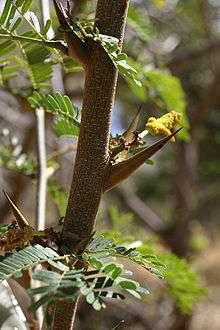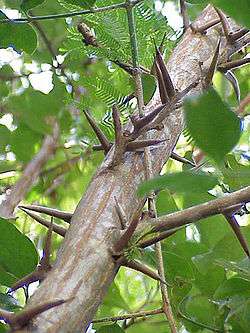Vachellia collinsii
| Vachellia collinsii | |
|---|---|
 | |
| V. collinsii in Guanacaste, Costa Rica. | |
| Scientific classification | |
| Kingdom: | Plantae |
| (unranked): | Angiosperms |
| (unranked): | Eudicots |
| (unranked): | Rosids |
| Order: | Fabales |
| Family: | Fabaceae |
| Genus: | Vachellia |
| Species: | V. collinsii |
| Binomial name | |
| Vachellia collinsii (Saff.) Seigler & Ebinger[1] | |
| Synonyms | |
|
Acacia collinsii Saff. | |
Vachellia collinsii is a species of flowering plant. It grows in secondary succession in seasonally dry ecosystems in southern Central America, where it exhibits a symbiotic relationship with several species of ant (Pseudomyrmex spinicola, Pseudomyrmex ferruginea). The ant-Vachellia system involving this species has been studied by ecologists like Daniel Janzen in Palo Verde National Park and Santa Rosa National Park, both in Guanacaste Province, Costa Rica. The ants chew holes in the tips of the hollow stipular thorns, known as domatia, so that they can enter, and create their colony inside. A single ant colony may span several V. collinsii trees.
The ants protect the trees from attack by other insects. Some ant species even cut down vegetation on the ground surrounding their trees and trim the encroaching branches of other plants, which allows the V. collinsii trees to thrive. In exchange, V. collinsii not only provides the ants with hollow thorns in which to live, but also produces lipid- and protein-rich food bodies, known as Beltian bodies, on the tips of new leaflets, which are consumed by the ants and are critical for larval growth. Vachellia collinsii also provides the ants with sugar-rich nectar from extrafloral nectaries located at the leaf petiole.

References
- ↑ Seigler DS, Ebinger JE. (2005). "New combinations in the genus Vachellia (Fabaceae: Mimosoideae) from the New World.". Phytologia. 87 (3): 139–78.
| Wikimedia Commons has media related to Vachellia collinsii. |